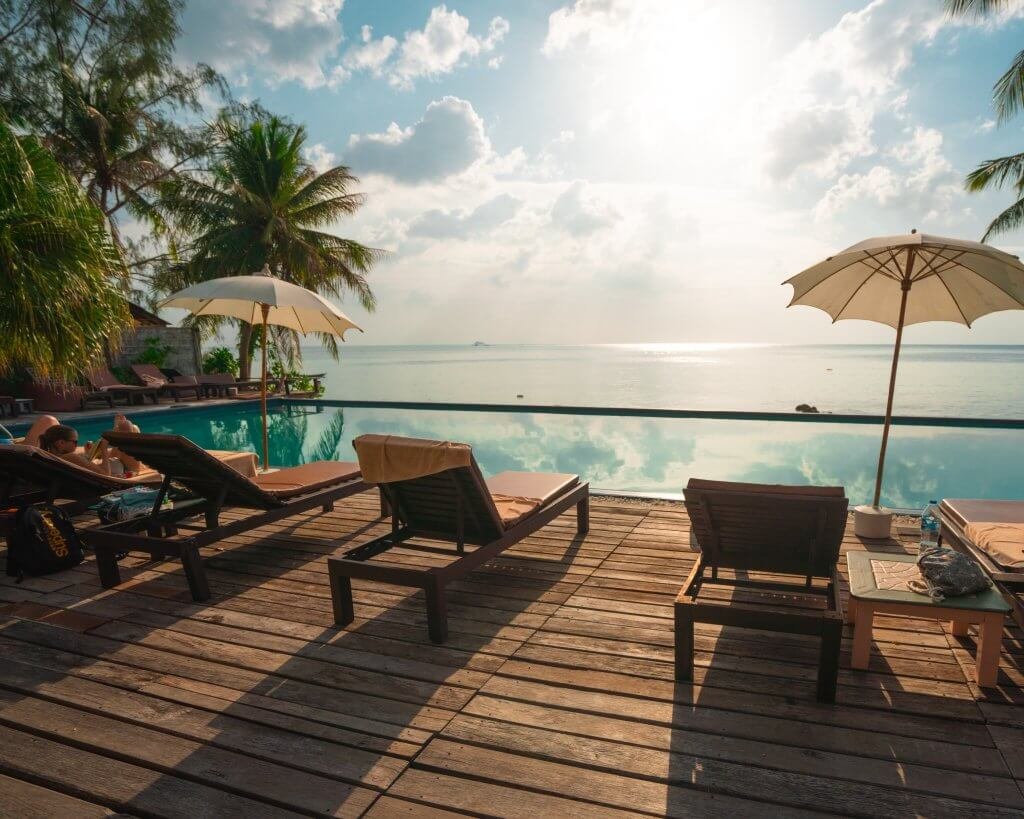As the hospitality industry continues to grow and independent properties gain even more traction, it’s key to look into the marketing trends that will define the year. Marketing is a powerful tool that has the ability to make or break a business, or even an entire destination.
Take Iceland, for example, which did such a great job at marketing that they now have an overtourism problem. While Iceland might be the extreme example, it just goes to show the power of marketing. No matter your property size or marketing budget, there are a lot of things you can do to put your property in an opportunistic position.

Contents
Localized SEO
Local SEO has gained traction over the past few years as internet directories and review websites have become more popular. Examples of local SEO opportunities include Google My Business, Bing Places for Business, Yelp, TripAdvisor, and even large OTAs like booking.com or Expedia.
Local SEO’s goal is to help the person searching for something find relevant, local results. Usually, when we discuss local SEO, we’re talking about how people within a certain destination find results in that destination. But in the case of travel, local SEO comes in handy when people are planning their trips as well.
Almost all online directories, including Google My Business and Bing Places for Business, are free. All you have to do is claim your listing and fill out your profile in its entirety. Usually, this includes your address, phone number, operating hours, and a description which you should use to include relevant keywords. Relevant keywords could include things like “best hostel in Belgium” or “cozy cottage in New Hampshire” – anything that will help potential travelers find you. For help on local SEO and what to prioritize, we suggest using Moz’s library of content.
Building Community with Social Media
It goes without saying that social media will continue to remain an important part of business to consumer marketing strategies. Social media evolves at a rapid pace, and the strategies that work in years past may not be optimal anymore. For example, Facebook regularly updates their algorithm, and in January 2018, they announced that the Newsfeed would start to feature more updates and posts from friends and family, rather than brands and publishers looking for engagement.
Facebook is seeking to rebalance users’ feeds. Therefore, posts that are passively consumed, like a static image that has been turned into a video to “trick” the feed will soon lose their virality. But, there is a way around this, and that’s through building a community and then tailoring your content to them. Facebook will rely more on engagement metrics, like shares and comments from friends, to gauge what to place in your feed. Posts that promote discussion and action will win.
This means hard sales and pushy posts will not do so great (they haven’t in a really long time). Whether we’re talking about Facebook, Twitter, or Instagram, the focus should turn to building an audience of people who care about your business and feel a certain way towards it. It doesn’t and shouldn’t push a sale, or booking, or whatever else. In the long run, what’s most beneficial is sharing knowledge, tips, insights, and building community.
Consider engaging your employees in the Tik Tok account of your hotel as well.
Some ways to build community: create a Facebook group for past guests to connect with one another or for people who are huge brand advocates. Or on Instagram, find relevant hashtags and comment thoughtful things on peoples’ posts to build an audience.
Reputation Management Continues to Be Important
Whether we like it or not, reputation management is here to stay for all business types. Review websites, like the ones we discussed in the local SEO section, have incredible power. Not only are they some of the top results on search engines, they’re actively sought out by travelers. Most consumers today will not book without first looking at at least one review site. And most of the time, if they’re booking on an OTA, they reviews will show up right alongside the “book now” button.
Reputation management is part proactive and part reactive. To be proactive, properties should directly ask happy customers to leave reviews – therefore positively padding your online presence.
Regardless of whether a review is positive or negative, someone from your property should respond to the review. In both the case of a positive or a negative review, a response shows that your property cares and listens to feedback. For negative reviews, always try to find a resolution, ideally off the public forum.
For 2018, create an action plan for reputation management that includes both asking for positive reviews and responding to any and all reviews on the most important sites.

Content Becomes the New Driver of SEO
SEO and content marketing go hand in hand. It has been a long time since creating a super optimized website with static content has been enough to get discovered online. Over the past few years and countless algorithm changes – websites that make frequent changes and have regular quality updates are in the best position to do well. Share timely content, city guides, local events, and other interesting information about your property and destination. You don’t have to be extremely well versed in technical SEO tactics to set yourself up for success. Do keyword research on a topic, and include them in your posts. Moz has fantastic learning center to get you started.
Live Chat
Communication is key and live chat windows, either on your property’s website or through another platform like Facebook Messenger, are among the newest and most effective communication channels
Over the years, we’ve been introduced to countless different mediums of communication. From SMS and email to Facebook Messenger and chatbots, there are countless ways for customers to get in contact with you.
Live chat works well because you’re able to supply information and fulfill requests in real time, unlike emails which may take longer to respond to. Chatbots and artificial intelligence are poised to be two of the next big things, especially in service industries like hospitality. The possibilities with artificial intelligence are endless, and we’ll soon fewer paper guides and maps in properties. Technology already has the ability to replace in-room guides, but artificial intelligence will take it to the next level and for guests to experience a new level of personalization without even talking to someone.
However, the chatbots and the artificial intelligence that will power them are still a couple years away from making their prime time debut, especially for independent properties.
A Wider Distribution Network
Specifically regarding the travel industry, one of the best ways to market your property to a wider audience is through distribution partners. Online travel agencies (OTAs) big and small offer properties of all types and sizes the ability to reach new and expansive audiences.
Large OTAs like Expedia, Hotels.com, or Booking.com cater to millions of travelers every single day – even if you are compared side-by-side to nearly every single one of your competitors. And then there are smaller, more niche distribution channels which help your property reach people of certain demographics or travel types. Take for example a company like Hipcamp. They cater to the young, adventurous camper who is looking for their next off the beaten path destination.
Reaching new customers in today’s market can be relatively painless, especially with the help of a channel manager. With the right technology, you can list your property’s inventory on many different sites without the fear of overbookings. This year, consider researching a few new channels that may be worth your while.
It’s always interesting to look back on the trends that were predicted for the previous year and see how things panned out. We were told video would dominate; mobile use would surpass desktop; reputation management would take off, and that print media wasn’t dead. While the last one is still up in the air, for the most part, those hit the mark or are well on their way.
So, here we go again. Feel free to check back in at the end of the year and let me know if my batting average should put me into the All-Star game or have me sitting on the bench.
1. OTA Advertising
OTAs have become synonymous with high fees, large percentages of business, and just overall market dominance with large ad budgets. For most properties, if you’re not playing ball with the OTAs, you are either in extremely high demand and don’t need to or you don’t have a clue. In recent years OTAs, specifically Orbitz and Expedia have introduced their own ad platforms. This isn’t necessarily new (and Orbitz was acquired); however their capabilities and importance in the advertising channels are increasing rapidly.
Typically these advertisements operate as part of the hotel search in a “sponsored placement” position (see image below). When clicked, the ad would take the visitor to the landing page for the hotel on the OTA. This is a great strategy for combatting low occupancy with targeting for specific periods. Most recently though, Expedia is offering the ability to advertise and link directly to the hotel’s website. Yes, it comes at a slightly higher CPC, but the opportunity is to drive direct and bypass the OTAs while using the OTAs.
Another notable mention in this space is TripAdvisor’s new system allowing for sponsored search. We expect this to be a focal point for TripAdvisor’s sales team in the coming year and beyond. So if you haven’t heard from them yet, don’t worry, you will!
2. Experiential Marketing
Sounds ominous, but it’s pretty straightforward; you want to sell an experience. Staying at a hotel isn’t just about a good night’s sleep. It’s about making memories. The goal of experiential marketing isn’t to pre-promote your hotel, but to compel them to lock in that memory so they can talk about it to their friends when they get home. Get where this is going?
Yep, Facebook, Instagram et al are highly effective in communicating more immersive experiential content. If potential customers see others who have stayed with you plastered all over their pages, and they look like they’re having a wonderful time doing cannonballs into your pool, that can go a long way. Denise Wong, the president of George P. Johnson Experiential Marketing, says: “Experiential work is where the rubber hits the road—where advertising meets the Amazon review.” You want your guests experiencing your hotel, not just dropping by.
3. Mobile-First Indexing
Google doesn’t sit still very long, which has its benefits and annoyances. But, like the IRS, it doesn’t really matter whether you like their changes or not. What matters is that you learn them and figure out how to take advantage of them. Their new deal is that your website performance on mobile is soon going to be primary and desktop performance secondary. No one is quite sure when this will happen, but Travel Tripper says that the rumor is it will formally appear later this year. Like a successful vacation, it’s all about planning.
If you’ve been dragging your feet for the last ten years and still don’t have a mobile-friendly version of your website, things may get a lot worse for you very soon. Google is going to base your search rankings first and foremost on your website’s mobile performance. The bottom line is, if you have somehow managed to appear on the first page of a results page without optimizing for mobile, you can probably kiss that goodbye.
In their summary, Moz.com drew up a simple diagram of the comparisons between the old and new systems, and how they will differ from each other:
4. Voice-First Speech
Ah, the good old days. Remember when you had to be able to type to find anything on the web? We may never be completely rid of the screen-first module, but the speech component in many devices like phones, tablets, and now Amazon’s Echo have really gained traction. Search Engine Land reports that 40% of adults now use voice to search at least once each day. Once again, your search engine optimization (SEO) is probably going to need some tweaking.
When SEO first gained prominence, and the importance of keywords began to evolve, we learned that when typing searches into Google, your search phrases didn’t need to be grammatically sound, as long as the keywords were intact. For example, Forbes notes that when typing, you might search for “luxury hotels in Beverly Hills,” while when speaking you would phrase it as a question such as “What are the best Beverly Hills luxury hotels?”. The most important takeaway from all of this is that long-tail keywords are going to become more important when distinguishing between these two types of search, and they will create less competition in site rankings. Google’s goal is always to connect the search with an appropriate result, and spoken details will make that outcome more likely.
5. Beacons and AR
Apparently, “reality” as a concept has lacked diversity. In addition to virtual reality, the hospitality industry now engages with terms like augmented reality (AR). Expect to see growth over the next few years.
Beacons are essentially the technology or the carriers for AR and other features. Most beacons for hotels are in the form of an app, which gives them access to hotel features. For example, Starwood Hotels & Resorts has an app for preferred customers whereby they can receive a digital key that unlocks their rooms. Virtually every major hotel chain offers rewards program apps giving guests access to local discounts, along with offers on food, drinks, spa, and golf. Beacons are a great option if you’re looking to incorporate new technology into your hotel and impress your guests with your amazing ability to adapt to change.
AR is a form of animation that happens in real time right on the device you’re using. You must have not only the technology for the device but the external hardware to connect to it to achieve real-time animation. Holiday Inn used AR with four different Olympians in its UK properties to promote the summer 2012 Olympics. Hospitality Technology suggests that hotels could use their print brochures and turn them into AR, or to incorporate AR into a hotel restaurant’s menu. Check out this example of a brochure utilizing AR technology.
6.Curated Videos and Photos
Let’s say you have a choice between reading a page of content and watching a two-minute video. Both have the same exact content. I don’t know about you, but I’m all over the video. More hotels are now taking video to the next level by curating or assembling existing online videos and presenting them in an organized fashion.
For example, if your hotel is near a major attraction, consider gathering existing videos and images from other sources and setting up a page on your website devoted exclusively to that venue. We aren’t all located in Orlando, but every town has some unique aspect it can highlight. Just be sure to credit the sources.
For those of you who still think videos are ineffective, check out some of these stats:
- The average person retains about 95% of the content from a video versus 10% when reading it.
- 60% of people prefer to watch a video, given the option.
- Video promotion is proven to be 600% more effective.
- And here’s the big one. The average website visitor spends 88% more time on websites that offer video.





